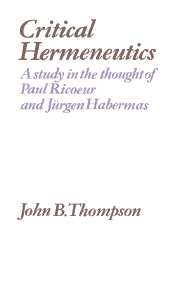Crossref Citations
This Book has been
cited by the following publications. This list is generated based on data provided by Crossref.
Giddens, Anthony
1981.
A Contemporary Critique of Historical Materialism.
p.
230.
Roweis, S T
1983.
Urban Planning as Professional Mediation of Territorial Politics.
Environment and Planning D: Society and Space,
Vol. 1,
Issue. 2,
p.
139.
Billinge, Mark
Gregory, Derek
and
Martin, Ron
1983.
Recollections of a Revolution.
p.
3.
Hayes, Adrian C.
1984.
Formal model building and theoretical interests in sociology.
The Journal of Mathematical Sociology,
Vol. 10,
Issue. 3-4,
p.
325.
McClure, John
1984.
On necessity and commonsense: A discussion of central axioms in new approaches to lay explanation.
European Journal of Social Psychology,
Vol. 14,
Issue. 2,
p.
123.
Dallmayr, Fred
1985.
Continental Perspectives and the Study of Politics.
News for Teachers of Political Science,
Vol. 44,
Issue. ,
p.
15.
SHONTZ, FRANKLIN C.
1985.
A Personologic Approach for Health Psychology Research.
American Behavioral Scientist,
Vol. 28,
Issue. 4,
p.
510.
Boucher, David
1985.
Texts in Context.
Vol. 12,
Issue. ,
p.
1.
Thompson, John B.
1986.
Language, ideology and the media: a response to Martin Montgomery.
Media, Culture & Society,
Vol. 8,
Issue. 1,
p.
65.
Cohen, Ira
1986.
The Status of Structuration Theory: A Reply to McLennan.
Theory, Culture & Society,
Vol. 3,
Issue. 1,
p.
123.
Cuthbert, A R
1987.
Hong Kong 1997: The Transition to Socialism—Ideology, Discourse, and Urban Spatial Structure.
Environment and Planning D: Society and Space,
Vol. 5,
Issue. 2,
p.
123.
Thompson, John B.
1987.
Language and Ideology: A Framework for Analysis.
The Sociological Review,
Vol. 35,
Issue. 3,
p.
516.
Outhwaite, William
1987.
New Philosophies of Social Science.
p.
61.
Tyson, B. Trevor
and
Low, Nicholas P.
1987.
Experiential Learning in Planning Education.
Journal of Planning Education and Research,
Vol. 7,
Issue. 1,
p.
15.
Kaphagawani, Didier Njirayamanda
1987.
African Philosophy.
p.
121.
King, R J
1988.
Urban Design in Capitalist Society.
Environment and Planning D: Society and Space,
Vol. 6,
Issue. 4,
p.
445.
Daneke, Gregory A.
1988.
ON PARADIGMATIC PROGRESS IN PUBUC POLICY AND ADMINISTRATION1.
Policy Studies Journal,
Vol. 17,
Issue. 2,
p.
277.
King, R J
1989.
Capital Switching and the Role of Ground Rent: 1 Theoretical Problems.
Environment and Planning A: Economy and Space,
Vol. 21,
Issue. 4,
p.
445.
Longhurst, Brian
1989.
Karl Mannheim and the Contemporary Sociology of Knowledge.
p.
25.
Strain, Michael
1989.
THE HERMENEUTICS OF EDUCATIONAL CHOICE.
Humanomics,
Vol. 5,
Issue. 2,
p.
21.



